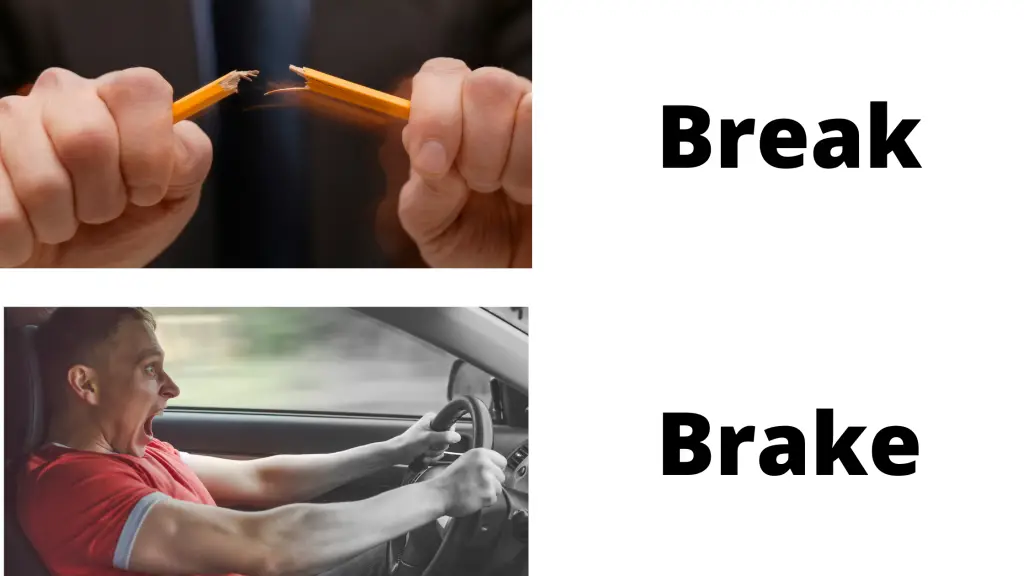Homophones are really tricky to tell apart. These are words that sound the same out loud but are spelled differently and have different meanings. One of the most commonly mixed-up homophones is break and brake.
Break means to physically divide something into different pieces. Brake means to stop a vehicle that is in motion. Both words can be used as a verb or a noun, so it is extremely important to understand the context of each word and when to use them.
Break
Break can be used as both a verb and a noun. As a verb, break means that something is being smashed or divided into several different pieces or causing something to stop functioning properly.
As a noun, break means a gap or a period of time that you are not doing any specific activity.
Verb Examples
I thought it was a good idea to “accidentally” break the TV to get a new one.
I didn’t think I would break my arm just tripping down the stairs, but here we are.
That guy said he saw the window break as someone forced their way into the closed store.
Noun Examples
There’s a break in the sidewalk, be careful not to trip.
The professor let us take a short break during test prep.
My boss said that my break was 45 minutes, but I know it wasn’t longer than 30.
Idioms
Break is also commonly used in idioms. These idioms show that break can be used both literally and figuratively.
The first idiom break is used in is “to break even”. This just means that there is no gain or loss and mostly refers to money. For example, “the company wasn’t expecting to make a profit, but they were at least hoping to break even“.
Another popular idiom is “to break ground”. This means starting construction and quite literally breaking the ground into pieces. For example,” they aren’t supposed to break ground on the new shopping center until next year”.
Break also means a pause. This could mean a pause during work or in a relationship . For example, you break up with someone if you don’t want to see them anymore. Additionally, when you get broken up with, you might say you are dealing with a heart break because you are devastated.
Brake
Just like break, brake can be used as both a noun and a verb. However, the meanings of brake are completely different than break.
As a verb, brake means to stop a vehicle that is in motion. As a noun, it refers to the device that is used to stop the vehicle.
Verb Examples
Quick, brake before you hit that pothole!
You shouldn’t wait to brake at the last second, that’s how people get in accidents.
The train was luckily able to brake fast enough to avoid hitting the turtle on the tracks.
Noun Examples
If you aren’t careful, you are going to damage the brake system on your car.
As I was riding my bike, the brake stopped working and I rode into a ditch.
Idioms
There is only one idiom that uses the word brake and shows it can be used both literally and figuratively.
The idiom is “to hit the brakes“. This means to hit the brakes on a vehicle or bring another type of endeavor to a stop. For example, “you need to hit the brakes before a cop sees you” is a literal example. You need to actually push the brakes on your vehicle to slow down.
“This relationship is moving too quickly, we need to hit the brakes“, is a figurative example. There is no actual brake that needs to be hit to slow down or stop the relationship.
Remembering the Differences
One of the easiest ways to remember the differences between break and brake is to look at their spelling.
Brake ends with ake like take. In order to slow down your vehicle, you need to tAKE your foot and put it on the brAKE.
- “How Was Your Weekend?” Alternative Ways to Improve Your Conversations - February 19, 2024
- On Monday or Monday? What’s the Difference? - December 1, 2023
- 20 Alternative Ways to say “Thanks for the Heads Up”(+ Meaning) - November 30, 2023

